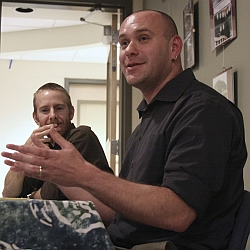Talking International Politics

Details
Students and professors crowded into the Center for Peace and Global Citizenship Café on September 30 to listen to the first of the“Borowiak-Mendelsohn Debates,” a series of talks focused on current issues and disagreements in the field of international politics.
The topic of the evening was“Non-State Actors in International Politics” and the speakers, Assistant Professors of Political Science Craig Borowiak and Barak Mendelsohn, got the chance to express their differing positions in a format that, despite the billing, was less formal debate and more conversation.
Borowiak's argument centered around the concept that states are constituted by non-state actors – citizens, civil society groups, corporations, labor unions, guerilla groups, peace activists, and others – which shape citizens' opinions of the state.“States are reactive, they aren't the leaders of progressive change,” he said.“The U.N. Charter starts with ‘We the peoples of the U.N.,' it does not begin with ‘We the states of the UN. ‘“Also, pointed out Borowiak,“The Geneva Conventions were organized by the Red Cross.”
Mendelsohn argued that the state based system was still dominant in the field of international politics, and non-state actors and non-governmental organizations (NGOs) merely operated within the state system, subordinate to states.“Non-state actors need states, states are the ones that are responsible and accountable,” he said.
Mendelsohn acknowledged that NGOs can influence policy by raising public awareness about issues, but argued that when the interests of the state are at stake, NGOs will be pushed aside.“NGOs can make states try war criminals,” Mendelsohn said,“but only when there's not much at stake. The Defense Minister of Iran has an international warrant for his arrest. But is any state actually going to take action?”
Both professors examined the the ways the NGOs could wield influence. Borowiak focused on how these groups could promote democratic principles by helping to increase the transparency of governments, monitoring violations, using their power to“name and shame” perpetrators, and bringing different groups together to work on shared goals.
Mendelsohn discussed the increasing relevance of NGOs in security issues, especially since the September 11th terrorist attacks, which he called the height of NGO influence.“Al Qaeda and other [NGOs] provoke states to mobilize resources,” he said.
As a future trend, both professors identified a blurring of the lines between NGOs and states, which could, both agreed, be dangerous.
Borowiak cited firms like Moody's and Standard and Poor's, which do financial analysis and rate the credit worthiness of companies, as NGOs that perform state-like regulatory functions, but are in fact private.“I think it's dangerous. States have one thing non-state actors don't: they serve the population and will be accountable to populations. When governing practices are privatized, [you] lose that control,” he said.
Mendelsohn also noted a blur in the security sector, particularly in the occupation of Iraq.“At first, security contractors only supported [military operations]. Now they're in the center,” he said.“I agree that it's dangerous. If the state can't provide security, the main rationale for the state's existence in the social contract is being undermined.”
-Andrew B. Thompson ‘12



